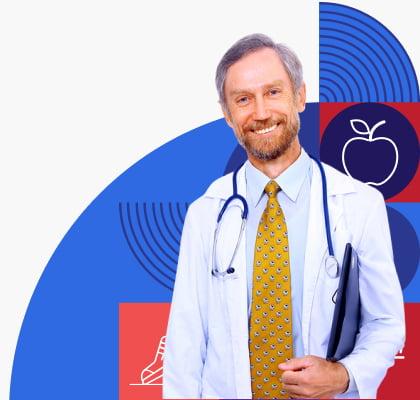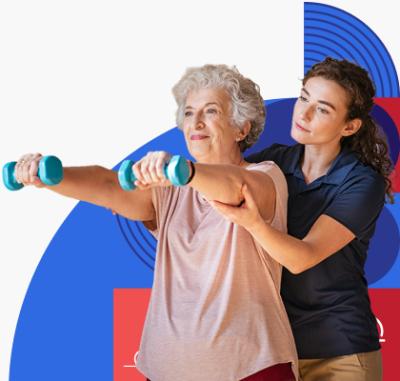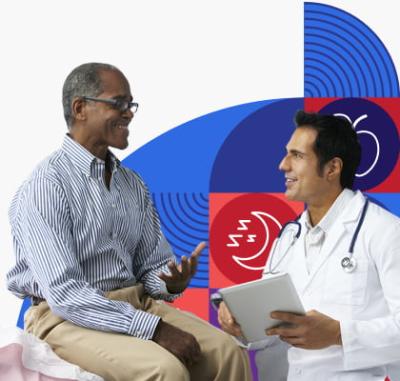Healthy Living
Use Medicines Safely

The Basics
Overview
When you’re sick, medicines can help you feel better and get well. But if you don’t follow the directions, medicines can harm you.
Any medicine can have side effects. But you can lower your chances of side effects from medicines by carefully following the directions on the medicine label or from your pharmacist, doctor, or nurse.
Side effects may be mild, like an upset stomach. Other side effects — like damage to your liver — can be more serious. Some side effects can even be deadly.
Take these steps to avoid problems with medicines:
- Follow the directions on the medicine label carefully
- If you don’t understand the directions, ask your doctor, nurse, or pharmacist to explain them to you
- Keep a list of all the medicines, vitamins, minerals, and herbs you use — and share this information with your doctor at your next checkup
- Store your medicines in a cool, dry place where children and pets can’t see or reach them
Types of Medicines
The 2 types of medicine are prescription and over-the-counter (OTC).
Prescription medicines
Prescription medicines are medicines you can get only with a prescription (order) from your doctor. You get these medicines from a pharmacy.
These medicines are only safe to use if your name is on the prescription. Using someone else’s prescription medicine can be very harmful.
Sometimes you can choose between a generic medicine and a brand name medicine. Generic and brand name medicines work the same way, but generic medicine usually costs less.
Talk to your doctor, pharmacist, or insurance company for more information about generic medicines. You can also read more about generic medicines.
Over-the-Counter Medicines
Over-the-counter (OTC) medicines are medicines you can buy at a store without a prescription.
Some examples of OTC medicines include:
- Cold and flu medicines
- Pain medicines like aspirin, acetaminophen, and ibuprofen
- Allergy medicines
- Sleep aids
- Toothpaste with fluoride
Read your medicine's Drug Facts label.
All OTC medicines come with a Drug Facts label. The information on this label can help you choose the right OTC medicine for your symptoms.
The Drug Facts label also gives you instructions for using the medicine safely. OTC medicines can cause side effects or harm if you use too much or don’t use them correctly.
Following the directions on the Drug Facts label will lower your chances of side effects. Learn more about what’s on the Drug Facts label.
Your doctor, nurse, or pharmacist can also help you choose OTC medicines and answer any questions you may have
Take Action
Talk to Your Doctor
Take these steps to prevent problems and mistakes with your medicines.
Talk to your doctor before starting a new medicine.
Before you use any new prescription medicines, tell your doctor:
- About other medicines you use — both prescription and OTC medicines
- About any vitamins, minerals, or herbs you use
- If you're allergic to any medicines
- If you’ve had side effects after using any medicines
- If you're pregnant or breastfeeding — this is because some medicines may harm your baby
- If you have any questions or concerns about the new medicine
Be sure to keep taking your prescription medicines until your doctor tells you it’s okay to stop — even if you’re feeling better. If you're worried the medicine is making you feel worse, tell your doctor. Keep in mind that sometimes you can get side effects when you stop your medicine.
Talk with your doctor about drug misuse.
If you think you may have a problem with either legal medicines or illegal drugs (like heroin or cocaine), tell your doctor. Your doctor needs to know what drugs you’re using before you start a new medicine — and treatment can help you stop misusing drugs. Learn more about getting help for drug misuse.
Take Time to Understand Directions
Follow the directions carefully.
Be sure to read the directions carefully when taking prescription or OTC medicines. Learn more about using OTC medicines safely.
If you notice unpleasant side effects after taking medicine, like feeling dizzy or having an upset stomach, call your doctor or nurse.
Ask questions to make sure you understand.
To use a medicine safely, you need to know:
- The name of the medicine
- Why you're using the medicine
- How to use the medicine the right way
- If there are any medicines you need to avoid while you’re taking this one
- What the side effects could be
- What to do if you start having side effects
- How to store medicine safely — and how to safely get rid of leftover or unused medicine
Ask your doctor or nurse questions to be sure you understand how to use your medicine. Take notes to help you remember the answers. You can even ask to record the instructions on your phone. Check out these questions to ask your doctor or nurse.
You can also ask a pharmacist if you forget how to use a medicine or you don’t understand the directions. Use these tips to talk with a pharmacist about your medicines.
Keep Track
Keep track of your medicines.
Follow these tips to help you keep track of your medicines:
- Use this resource to make a list of the medicines you use [PDF - 156 KB]. Write down how much you use and when you use each medicine — and make sure to include any dietary supplements (vitamins, minerals, or herbs) you take.
- Take the list with you whenever you go to a medical appointment. You may also want to make a copy to give to a family member or friend in case you have a medical emergency.
- Read and save any information that comes with your medicine.
- Keep your medicine in the box or bottle it came in so you have all the information from the label.
- Pay attention to the color and shape of your pills. If they look different when you get a refill, ask your pharmacist to double-check that you have the right medicine.
Keep Them Safe
Put your medicines in a safe place.
Your medicines will last longer and work better if you store them correctly. Follow these tips:
- Check for storage instructions on the medicine label — for example, some medicines need to be stored in the refrigerator.
- Store medicines that don't have special storage instructions in a cool, dry place. Medicines can go bad in places that are damp and warm, like the kitchen or bathroom.
- Keep medicines away from children and pets. Using a locked box, cabinet, or closet is best. Get more tips for how to keep medicines away from children.
- Get rid of expired (out-of-date) medicines and medicines you no longer use. Follow these instructions to get rid of old or extra medicines safely.
Call the Poison Control Center (1-800-222-1222) right away if a child or someone else accidentally uses your medicine.
Content last updated December 17, 2024
Reviewer Information
This information on using medicines safely was adapted from materials from the Food and Drug Administration and the Agency for Healthcare Research and Quality.
Reviewed by:
Jigna Patel
Pharmacist
Food and Drug Administration
Division of Drug Information (DDI)


